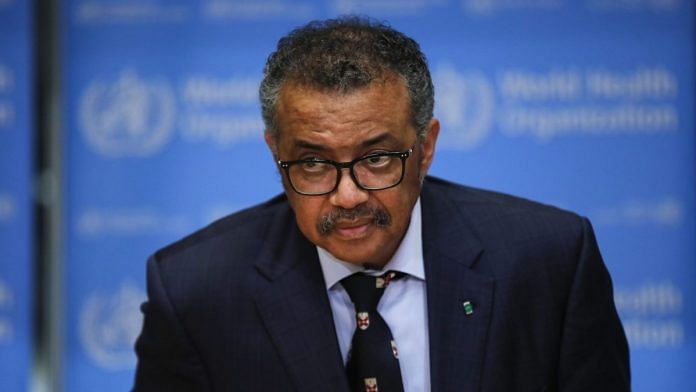New Delhi: The World Health Organization’s (WHO) Director-General, Dr Tedros Adhanom Ghebreyesus warned Monday that the Covid-19 pandemic is “speeding up” and the “worst is yet to come”.
In his daily press briefing, the WHO chief noted that the “lack of national unity and lack of global solidarity” was actually “helping the virus spread”.
“Some countries are now experiencing a resurgence of cases as they start to re-open their economies and societies. Most people remain susceptible. The virus still has a lot of room to move,” he said.
Ghebreyesus bluntly added, “But the hard reality is: This is not even close to being over. Although many countries have made some progress, globally the pandemic is actually speeding up.”
Media briefing on #COVID19 with @DrTedros https://t.co/cOhlLvleea
— World Health Organization (WHO) (@WHO) June 29, 2020
Also read: Govt must focus on controlling Covid deaths, not just recovery rate: Public health expert
‘Quarantine Covid politics’
Marking the six-month anniversary of the outbreak, the WHO chief pointed out the concerning signs of stigma, misinformation and the politicisation of the pandemic.
“Please quarantine covid politics,” he said, adding that “the virus has two dangerous combinations … one is it’s fast, it’s contagious and second is, it’s a killer. It can exploit divisions”.
Ghebreyesus also confirmed that the WHO was sending a team to China next week to investigate the origins of the virus.
“We can fight the virus better when we know everything about the virus, including how it started,” he said.
Also read: Fate of the world’s health rests between China and Trump — right where WHO is stuck
Contact tracing important
Ghebreyesus also criticised governments that failed to establish reliable contact tracing mechanisms to stop the spread of the virus.
He said the solution to the virus continues to be the same: “Test, trace, isolate and quarantine”.
He added, “If any country is saying contact tracing is difficult, it is a lame excuse.”
“The lame excuse is there are ‘too many’ … Trust me there are not too many in war situations. If contact tracing helps you to win the fight, you do it even risking your life…”
WHO has praised Germany, Japan and South Korea for using this approach efficiently.
“The single-most important intervention for breaking chains of transmission is not necessarily high-tech and can be carried out by a broad range of professionals. It’s tracing and quarantining contacts,” said Dr Mike Ryan, Executive Director, WHO Health Emergencies Programme.
Also read: Contaminated waste — the epidemic the world is struggling with thanks to Covid-19
Five priorities to focus on apart from vaccines
The director-general highlighted that “although a vaccine will be an important long-term tool for controlling COVID-19, there are five priorities that every single country must focus on now, to save lives now”.
“Your health is in your hands … That includes physical distancing, hand hygiene, covering coughs, staying home if you feel sick, wearing masks when appropriate, and only sharing information from reliable sources.
“You may be in a low-risk category, but the choices you make could be the difference between life and death for someone else,” he said.
The second is to suppress transmission. Whether countries have no cases, clusters of cases or community transmission, there are steps all countries can take to suppress the spread of the virus, he said.
“Improve surveillance to find cases,” he added while repeatedly stressing on the importance of tracing and quarantining.
Ghebreyesus said the third priority should be to “save lives”. “Early identification and clinical care saves lives. Providing oxygen and dexamethasone to people with severe and critical disease, saves lives,” he said and advised countries to pay special attention to high-risk groups.
“Japan has done this: it has one of the highest populations of elderly people, but its death rate is low”
Fourth is to “accelerate research”, while fifth is “political leadership”. He emphasised that global solidarity was crucial to the pandemic response and to “implement a comprehensive strategy to suppress transmission”.
“We’ve already learned a lot about this virus, but there’s still a lot we don’t know — and there are still tools we need,” concluded Ghebreyesus.
Also read: A huge mental health crisis awaits India post-Covid, but only the power of community will help



